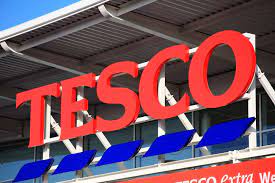
As the company reported a 9% increase in underlying quarterly UK sales, Tesco, the largest retailer in the UK, said the country's food inflation was beginning to lessen, providing some respite for stressed consumers and the larger economy.
"We do believe that we're past the peak inflation," CEO Ken Murphy told reporters on Friday.
Outpacing pay growth, stubbornly high inflation has become a significant political concern in the nation, and rising taxes and mortgage rates are also having a negative impact on household finances.
The most recent official data indicate that food inflation was over 19% in April, undermining Prime Minister Rishi Sunak's core economic commitment to halve inflation in 2023.
According to industry figures, food inflation decreased marginally in May to 17.2%.
Murphy noted that the costs of goods like milk, bread, pasta, and oil were declining, describing them as early signs of good things to come. However, he cautioned that some prices were still rising, citing proteins (meat), sugar, coffee, rice, and potatoes as examples.
Tesco anticipates that prices will increase this year, but at a slower pace of inflation. Murphy claimed that pressure from high energy prices and growing salaries was still present.
"The labour element of inflation is likely to stick," he warned.
The CEO also retaliated against others who have criticised supermarkets for their persistently high inflation rates, such as the Bank of England.
According to Tesco, which controls more than 27% of the British grocery market, the increase in sales for the 13 weeks ending May 27 put the company on track for a basically flat full-year retail adjusted operating profit, which is its primary profit indicator.
In 2022–2023, it generated 2.49 billion pounds ($3.18 billion).
Inflation increased sales. In general, Murphy said Tesco continued to experience small volume decreases during the period, especially in areas that are more optional, such general items.
With more individuals pampering themselves, the group has profited from consumers trying to save money by entertaining and cooking at home rather than dining out. This has helped sales of its premium "Finest" collection.
By price matching with discounter Aldi, utilising its Clubcard loyalty programme, and lowering prices when commodity costs do decline, it has helped value-conscious consumers on the other end of the spectrum.
"Tesco is strengthening its grip on its position as the UK’s top supermarket," said John Moore, senior investment manager at Brewin Dolphin.
The company's shares, which have increased 17% so far in 2023, decreased 0.9% in early morning trade.
(Source:www.theguardian.com)
"We do believe that we're past the peak inflation," CEO Ken Murphy told reporters on Friday.
Outpacing pay growth, stubbornly high inflation has become a significant political concern in the nation, and rising taxes and mortgage rates are also having a negative impact on household finances.
The most recent official data indicate that food inflation was over 19% in April, undermining Prime Minister Rishi Sunak's core economic commitment to halve inflation in 2023.
According to industry figures, food inflation decreased marginally in May to 17.2%.
Murphy noted that the costs of goods like milk, bread, pasta, and oil were declining, describing them as early signs of good things to come. However, he cautioned that some prices were still rising, citing proteins (meat), sugar, coffee, rice, and potatoes as examples.
Tesco anticipates that prices will increase this year, but at a slower pace of inflation. Murphy claimed that pressure from high energy prices and growing salaries was still present.
"The labour element of inflation is likely to stick," he warned.
The CEO also retaliated against others who have criticised supermarkets for their persistently high inflation rates, such as the Bank of England.
According to Tesco, which controls more than 27% of the British grocery market, the increase in sales for the 13 weeks ending May 27 put the company on track for a basically flat full-year retail adjusted operating profit, which is its primary profit indicator.
In 2022–2023, it generated 2.49 billion pounds ($3.18 billion).
Inflation increased sales. In general, Murphy said Tesco continued to experience small volume decreases during the period, especially in areas that are more optional, such general items.
With more individuals pampering themselves, the group has profited from consumers trying to save money by entertaining and cooking at home rather than dining out. This has helped sales of its premium "Finest" collection.
By price matching with discounter Aldi, utilising its Clubcard loyalty programme, and lowering prices when commodity costs do decline, it has helped value-conscious consumers on the other end of the spectrum.
"Tesco is strengthening its grip on its position as the UK’s top supermarket," said John Moore, senior investment manager at Brewin Dolphin.
The company's shares, which have increased 17% so far in 2023, decreased 0.9% in early morning trade.
(Source:www.theguardian.com)





